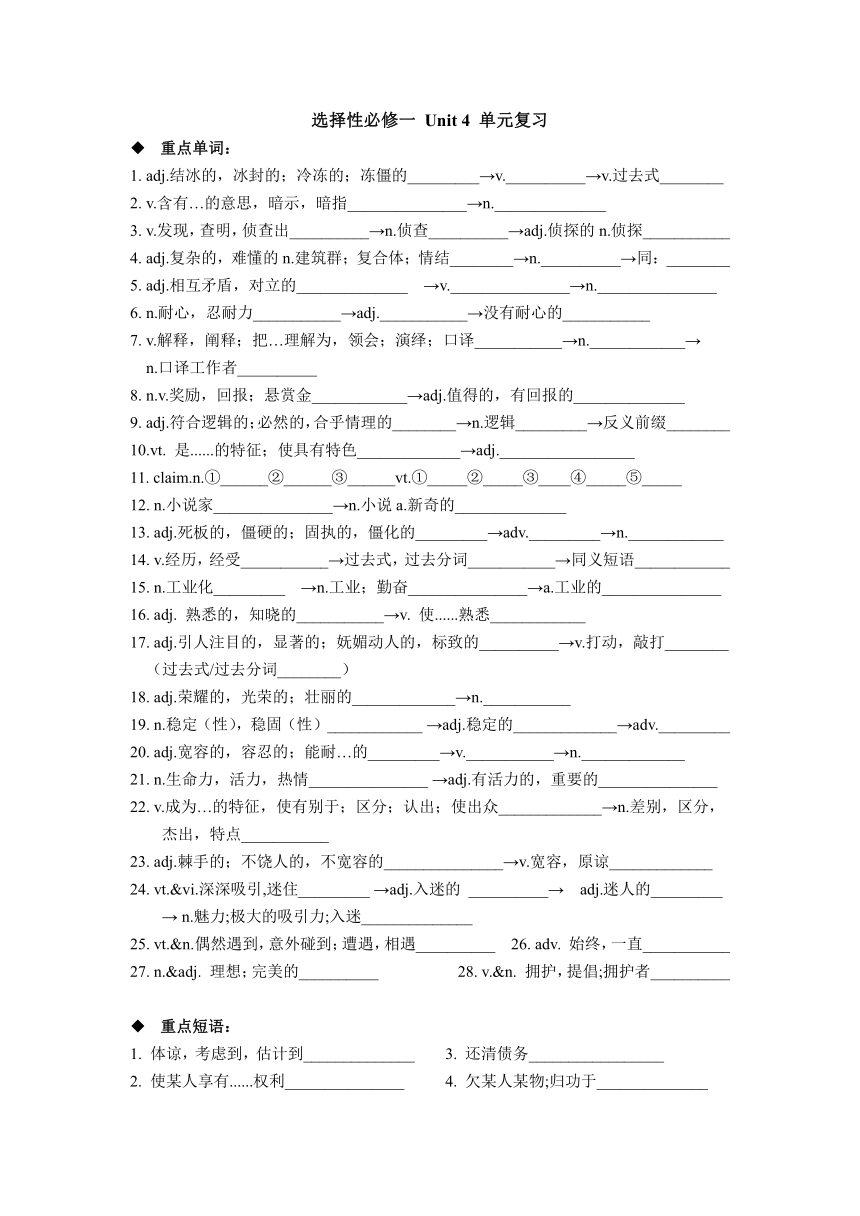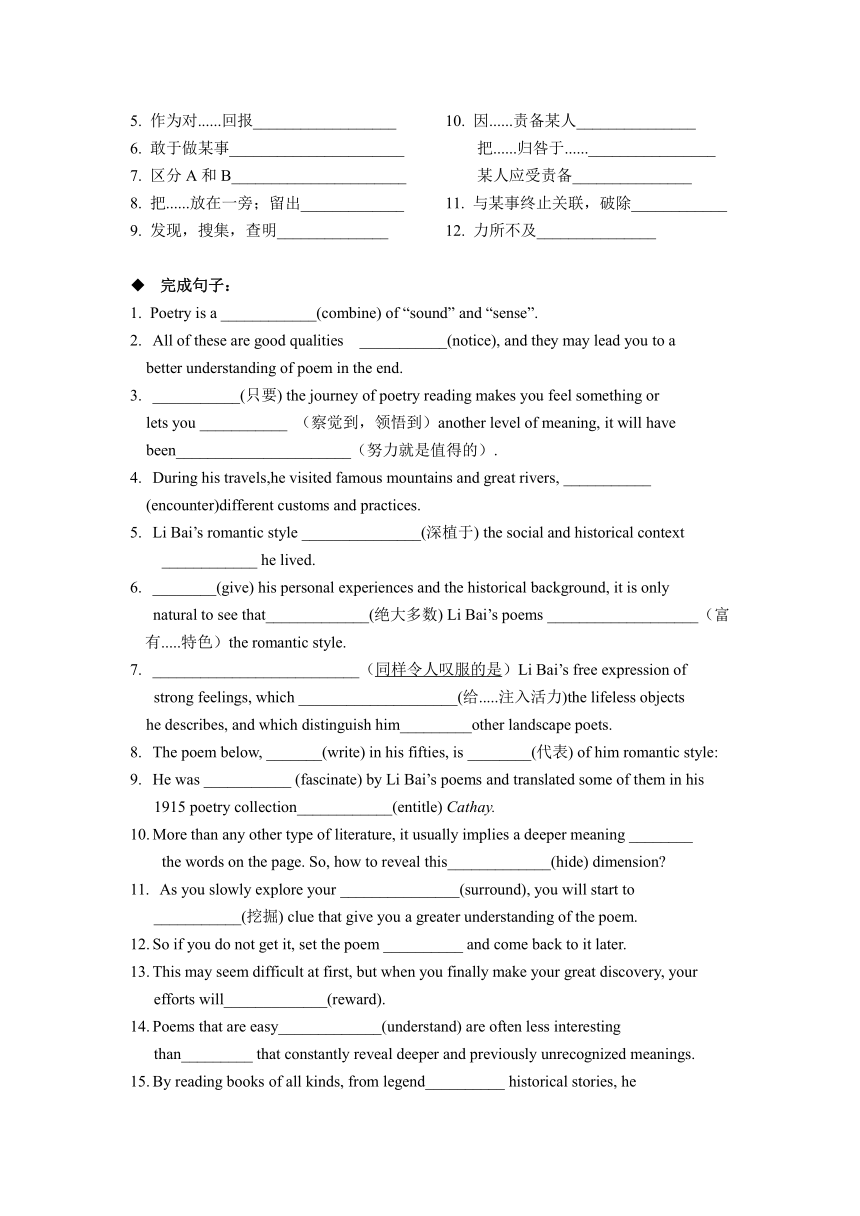牛津译林版(2019)选择性必修 第一册Unit 4 Exploring poetry单元复习 (含答案)
文档属性
| 名称 | 牛津译林版(2019)选择性必修 第一册Unit 4 Exploring poetry单元复习 (含答案) |  | |
| 格式 | docx | ||
| 文件大小 | 39.2KB | ||
| 资源类型 | 教案 | ||
| 版本资源 | 牛津译林版(2019) | ||
| 科目 | 英语 | ||
| 更新时间 | 2024-04-04 09:46:49 | ||
图片预览


文档简介
选择性必修一 Unit 4 单元复习
重点单词:
1. adj.结冰的,冰封的;冷冻的;冻僵的_________→v.__________→v.过去式________
2. v.含有…的意思,暗示,暗指_______________→n.______________
3. v.发现,查明,侦查出__________→n.侦查__________→adj.侦探的n.侦探___________
4. adj.复杂的,难懂的n.建筑群;复合体;情结________→n.__________→同:________
5. adj.相互矛盾,对立的______________ →v._______________→n._______________
6. n.耐心,忍耐力___________→adj.___________→没有耐心的___________
7. v.解释,阐释;把…理解为,领会;演绎;口译___________→n.____________→
n.口译工作者__________
8. n.v.奖励,回报;悬赏金____________→adj.值得的,有回报的______________
9. adj.符合逻辑的;必然的,合乎情理的________→n.逻辑_________→反义前缀________
10.vt. 是......的特征;使具有特色_____________→adj._________________
11. claim.n.①______②______③______vt.①_____②_____③____④_____⑤_____
12. n.小说家_______________→n.小说a.新奇的______________
13. adj.死板的,僵硬的;固执的,僵化的_________→adv._________→n.____________
14. v.经历,经受___________→过去式,过去分词___________→同义短语____________
15. n.工业化_________ →n.工业;勤奋_______________→a.工业的_______________
16. adj. 熟悉的,知晓的___________→v. 使......熟悉____________
17. adj.引人注目的,显著的;妩媚动人的,标致的__________→v.打动,敲打________
(过去式/过去分词________)
18. adj.荣耀的,光荣的;壮丽的_____________→n.___________
19. n.稳定(性),稳固(性)____________ →adj.稳定的_____________→adv._________
20. adj.宽容的,容忍的;能耐…的_________→v.___________→n._____________
21. n.生命力,活力,热情_______________ →adj.有活力的,重要的_______________
22. v.成为…的特征,使有别于;区分;认出;使出众_____________→n.差别,区分,
杰出,特点___________
23. adj.棘手的;不饶人的,不宽容的_______________→v.宽容,原谅_____________
24. vt.&vi.深深吸引,迷住_________ →adj.入迷的 __________→ adj.迷人的_________
→ n.魅力;极大的吸引力;入迷______________
25. vt.&n.偶然遇到,意外碰到;遭遇,相遇__________ 26. adv. 始终,一直___________
27. n.&adj. 理想;完美的__________ 28. v.&n. 拥护,提倡;拥护者__________
重点短语:
体谅,考虑到,估计到______________
使某人享有......权利_______________
还清债务_________________
欠某人某物;归功于______________
作为对......回报__________________
敢于做某事______________________
区分A和B______________________
把......放在一旁;留出_____________
发现,搜集,查明______________
因......责备某人_______________
把......归咎于......________________
某人应受责备_______________
与某事终止关联,破除____________
力所不及_______________
完成句子:
Poetry is a ____________(combine) of “sound” and “sense”.
All of these are good qualities ___________(notice), and they may lead you to a
better understanding of poem in the end.
___________(只要) the journey of poetry reading makes you feel something or
lets you ___________ (察觉到,领悟到)another level of meaning, it will have
been______________________(努力就是值得的).
During his travels,he visited famous mountains and great rivers, ___________
(encounter)different customs and practices.
Li Bai’s romantic style _______________(深植于) the social and historical context
____________ he lived.
________(give) his personal experiences and the historical background, it is only
natural to see that_____________(绝大多数) Li Bai’s poems ___________________(富有.....特色)the romantic style.
__________________________(同样令人叹服的是)Li Bai’s free expression of
strong feelings, which ____________________(给.....注入活力)the lifeless objects
he describes, and which distinguish him_________other landscape poets.
The poem below, _______(write) in his fifties, is ________(代表) of him romantic style:
He was ___________ (fascinate) by Li Bai’s poems and translated some of them in his
1915 poetry collection____________(entitle) Cathay.
More than any other type of literature, it usually implies a deeper meaning ________
the words on the page. So, how to reveal this_____________(hide) dimension
As you slowly explore your _______________(surround), you will start to
___________(挖掘) clue that give you a greater understanding of the poem.
So if you do not get it, set the poem __________ and come back to it later.
This may seem difficult at first, but when you finally make your great discovery, your
efforts will_____________(reward).
Poems that are easy_____________(understand) are often less interesting
than_________ that constantly reveal deeper and previously unrecognized meanings.
By reading books of all kinds, from legend__________ historical stories, he
_________(familiar) himself with classical Chinese culture, and more importantly,
he acquired the___________ (wise) of previous generations.
答案:
重点单词:
1. adj.结冰的,冰封的;冷冻的;冻僵的 frozen→v. freeze→v.过去式 froze
2. v.含有…的意思,暗示,暗指 imply →n. implication
3. v.发现,查明,侦查出detect→n.侦查detection→adj.侦探的n.侦探detective
4. adj.复杂的,难懂的n.建筑群;复合体;情结complex→n. complexity→同:complicated
5. adj.相互矛盾,对立的contradictory →v.contradict→n.contradiction
6. n.耐心,忍耐力patience→adj.patient→没有耐心的impatient
7. v.解释,阐释;把…理解为,领会;演绎;口译interpret→n.interpretation→
n.口译工作者interpreter
8. n.v.奖励,回报;悬赏金 reward→adj.值得的,有回报的rewarding
9. adj.符合逻辑的;必然的,合乎情理的logical→n.逻辑logic →反义前缀il-
10.vt. 是......的特征;使具有特色 characterize →adj.characteristic
11. claim.n.①声明,宣称②所有权③索赔vt.①宣称②要求③索取④获得⑤夺走
12. n.小说家novelist→n.小说a.新奇的 novel
13. adj.死板的,僵硬的;固执的,僵化的 rigid→adv.rigidly →n.rigidity
14. v.经历,经受undergo →过去式,过去分词underwent/undergone→同义短语go through
15. n.工业化industrialization→n.工业;勤奋industry→a.工业的industrial
16. adj. 熟悉的,知晓的familiar→v. 使......熟悉familiarize
17. adj.引人注目的,显著的;妩媚动人的,标致的striking→v.打动,敲打strike
(过去式/过去分词struck)
18. adj.荣耀的,光荣的;壮丽的glorious→n.glory
19. n.稳定(性),稳固(性)stability →adj.稳定的stable→adv.stably
20. adj.宽容的,容忍的;能耐…的tolerant→v.tolerate→n.tolerance
21. n.生命力,活力,热情vitality →adj.有活力的,重要的vital
22. v.成为…的特征,使有别于;区分;认出;使出众distinguish→n.差别,区分,
杰出,特点distinction
23. adj.棘手的;不饶人的,不宽容的unforgiving→v.宽容,原谅forgive(forgave/forgiven)
24. vt.&vi.深深吸引,迷住fascinate →adj.入迷的 fascinated→ adj.迷人的fascinating
→ n.魅力;极大的吸引力;入迷fascination
25. vt.&n.偶然遇到,意外碰到;遭遇,相遇encounter 26. adv. 始终,一直constantly
27. n.&adj. 理想;完美的ideal 28. v.&n. 拥护,提倡;拥护者advocate
重点短语:
体谅,考虑到,估计make allowance for
使某人享有......权利be entitled to
还清债务pay off one’s debt
欠某人某物;归功于owe sth. to
作为对......回报as a reward for/in reward for
敢于做某事dare to do
区分A和B distinguish ...from...
把......放在一旁;留出set aside
发现,搜集,查明dig up
因......责备某人blame sb. for sth.
把......归咎于......blame sth. on sb.
某人应受责备be to blame
与某事终止关联,破除break with
力所不及beyond one’s grasp
完成句子:
Poetry is a combination (combine) of “sound” and “sense”.
All of these are good qualities to notice (notice), and they may lead you to a better understanding of poem in the end.
As long as (只要) the journey of poetry reading makes you feel something or lets you perceive (察觉到,领悟到)another level of meaning, it will havebeen worth your effort.(努力就是值得的).
During his travels,he visited famous mountains and great rivers, encountering
(encounter)different customs and practices.
Li Bai’s romantic style was deeply rooted in (深植于) the social and historical context
Where/in which he lived.
Given (give) his personal experiences and the historical background, it is only
natural to see that the majority of(绝大多数) Li Bai’s poems are characterized by(富有.....特色)the romantic style.
Equally impressive is(同样令人叹服的是)Li Bai’s free expression of
strong feelings, which breathes vitality into(给.....注入活力)the lifeless objects
he describes, and which distinguish him from other landscape poets.
The poem below, written (write) in his fifties, is representative (代表) of him romantic style.
He was fascinated (fascinate) by Li Bai’s poems and translated some of them in his
1915 poetry collection entitled (entitle) Cathay.
More than any other type of literature, it usually implies a deeper meaning beyond
the words on the page. So, how to reveal this hidden (hide) dimension
As you slowly explore your surroundings (surround), you will start to
dig up (挖掘) clue that give you a greater understanding of the poem.
So if you do not get it, set the poem aside and come back to it later.
This may seem difficult at first, but when you finally make your great discovery, your
efforts will be rewarded (reward).
Poems that are easy to understand (understand) are often less interesting
Than those that constantly reveal deeper and previously unrecognized meanings.
By reading books of all kinds, from legend to historical stories, he
familiarized (familiar) himself with classical Chinese culture, and more importantly,
he acquired the wisdom (wise) of previous generations.
重点单词:
1. adj.结冰的,冰封的;冷冻的;冻僵的_________→v.__________→v.过去式________
2. v.含有…的意思,暗示,暗指_______________→n.______________
3. v.发现,查明,侦查出__________→n.侦查__________→adj.侦探的n.侦探___________
4. adj.复杂的,难懂的n.建筑群;复合体;情结________→n.__________→同:________
5. adj.相互矛盾,对立的______________ →v._______________→n._______________
6. n.耐心,忍耐力___________→adj.___________→没有耐心的___________
7. v.解释,阐释;把…理解为,领会;演绎;口译___________→n.____________→
n.口译工作者__________
8. n.v.奖励,回报;悬赏金____________→adj.值得的,有回报的______________
9. adj.符合逻辑的;必然的,合乎情理的________→n.逻辑_________→反义前缀________
10.vt. 是......的特征;使具有特色_____________→adj._________________
11. claim.n.①______②______③______vt.①_____②_____③____④_____⑤_____
12. n.小说家_______________→n.小说a.新奇的______________
13. adj.死板的,僵硬的;固执的,僵化的_________→adv._________→n.____________
14. v.经历,经受___________→过去式,过去分词___________→同义短语____________
15. n.工业化_________ →n.工业;勤奋_______________→a.工业的_______________
16. adj. 熟悉的,知晓的___________→v. 使......熟悉____________
17. adj.引人注目的,显著的;妩媚动人的,标致的__________→v.打动,敲打________
(过去式/过去分词________)
18. adj.荣耀的,光荣的;壮丽的_____________→n.___________
19. n.稳定(性),稳固(性)____________ →adj.稳定的_____________→adv._________
20. adj.宽容的,容忍的;能耐…的_________→v.___________→n._____________
21. n.生命力,活力,热情_______________ →adj.有活力的,重要的_______________
22. v.成为…的特征,使有别于;区分;认出;使出众_____________→n.差别,区分,
杰出,特点___________
23. adj.棘手的;不饶人的,不宽容的_______________→v.宽容,原谅_____________
24. vt.&vi.深深吸引,迷住_________ →adj.入迷的 __________→ adj.迷人的_________
→ n.魅力;极大的吸引力;入迷______________
25. vt.&n.偶然遇到,意外碰到;遭遇,相遇__________ 26. adv. 始终,一直___________
27. n.&adj. 理想;完美的__________ 28. v.&n. 拥护,提倡;拥护者__________
重点短语:
体谅,考虑到,估计到______________
使某人享有......权利_______________
还清债务_________________
欠某人某物;归功于______________
作为对......回报__________________
敢于做某事______________________
区分A和B______________________
把......放在一旁;留出_____________
发现,搜集,查明______________
因......责备某人_______________
把......归咎于......________________
某人应受责备_______________
与某事终止关联,破除____________
力所不及_______________
完成句子:
Poetry is a ____________(combine) of “sound” and “sense”.
All of these are good qualities ___________(notice), and they may lead you to a
better understanding of poem in the end.
___________(只要) the journey of poetry reading makes you feel something or
lets you ___________ (察觉到,领悟到)another level of meaning, it will have
been______________________(努力就是值得的).
During his travels,he visited famous mountains and great rivers, ___________
(encounter)different customs and practices.
Li Bai’s romantic style _______________(深植于) the social and historical context
____________ he lived.
________(give) his personal experiences and the historical background, it is only
natural to see that_____________(绝大多数) Li Bai’s poems ___________________(富有.....特色)the romantic style.
__________________________(同样令人叹服的是)Li Bai’s free expression of
strong feelings, which ____________________(给.....注入活力)the lifeless objects
he describes, and which distinguish him_________other landscape poets.
The poem below, _______(write) in his fifties, is ________(代表) of him romantic style:
He was ___________ (fascinate) by Li Bai’s poems and translated some of them in his
1915 poetry collection____________(entitle) Cathay.
More than any other type of literature, it usually implies a deeper meaning ________
the words on the page. So, how to reveal this_____________(hide) dimension
As you slowly explore your _______________(surround), you will start to
___________(挖掘) clue that give you a greater understanding of the poem.
So if you do not get it, set the poem __________ and come back to it later.
This may seem difficult at first, but when you finally make your great discovery, your
efforts will_____________(reward).
Poems that are easy_____________(understand) are often less interesting
than_________ that constantly reveal deeper and previously unrecognized meanings.
By reading books of all kinds, from legend__________ historical stories, he
_________(familiar) himself with classical Chinese culture, and more importantly,
he acquired the___________ (wise) of previous generations.
答案:
重点单词:
1. adj.结冰的,冰封的;冷冻的;冻僵的 frozen→v. freeze→v.过去式 froze
2. v.含有…的意思,暗示,暗指 imply →n. implication
3. v.发现,查明,侦查出detect→n.侦查detection→adj.侦探的n.侦探detective
4. adj.复杂的,难懂的n.建筑群;复合体;情结complex→n. complexity→同:complicated
5. adj.相互矛盾,对立的contradictory →v.contradict→n.contradiction
6. n.耐心,忍耐力patience→adj.patient→没有耐心的impatient
7. v.解释,阐释;把…理解为,领会;演绎;口译interpret→n.interpretation→
n.口译工作者interpreter
8. n.v.奖励,回报;悬赏金 reward→adj.值得的,有回报的rewarding
9. adj.符合逻辑的;必然的,合乎情理的logical→n.逻辑logic →反义前缀il-
10.vt. 是......的特征;使具有特色 characterize →adj.characteristic
11. claim.n.①声明,宣称②所有权③索赔vt.①宣称②要求③索取④获得⑤夺走
12. n.小说家novelist→n.小说a.新奇的 novel
13. adj.死板的,僵硬的;固执的,僵化的 rigid→adv.rigidly →n.rigidity
14. v.经历,经受undergo →过去式,过去分词underwent/undergone→同义短语go through
15. n.工业化industrialization→n.工业;勤奋industry→a.工业的industrial
16. adj. 熟悉的,知晓的familiar→v. 使......熟悉familiarize
17. adj.引人注目的,显著的;妩媚动人的,标致的striking→v.打动,敲打strike
(过去式/过去分词struck)
18. adj.荣耀的,光荣的;壮丽的glorious→n.glory
19. n.稳定(性),稳固(性)stability →adj.稳定的stable→adv.stably
20. adj.宽容的,容忍的;能耐…的tolerant→v.tolerate→n.tolerance
21. n.生命力,活力,热情vitality →adj.有活力的,重要的vital
22. v.成为…的特征,使有别于;区分;认出;使出众distinguish→n.差别,区分,
杰出,特点distinction
23. adj.棘手的;不饶人的,不宽容的unforgiving→v.宽容,原谅forgive(forgave/forgiven)
24. vt.&vi.深深吸引,迷住fascinate →adj.入迷的 fascinated→ adj.迷人的fascinating
→ n.魅力;极大的吸引力;入迷fascination
25. vt.&n.偶然遇到,意外碰到;遭遇,相遇encounter 26. adv. 始终,一直constantly
27. n.&adj. 理想;完美的ideal 28. v.&n. 拥护,提倡;拥护者advocate
重点短语:
体谅,考虑到,估计make allowance for
使某人享有......权利be entitled to
还清债务pay off one’s debt
欠某人某物;归功于owe sth. to
作为对......回报as a reward for/in reward for
敢于做某事dare to do
区分A和B distinguish ...from...
把......放在一旁;留出set aside
发现,搜集,查明dig up
因......责备某人blame sb. for sth.
把......归咎于......blame sth. on sb.
某人应受责备be to blame
与某事终止关联,破除break with
力所不及beyond one’s grasp
完成句子:
Poetry is a combination (combine) of “sound” and “sense”.
All of these are good qualities to notice (notice), and they may lead you to a better understanding of poem in the end.
As long as (只要) the journey of poetry reading makes you feel something or lets you perceive (察觉到,领悟到)another level of meaning, it will havebeen worth your effort.(努力就是值得的).
During his travels,he visited famous mountains and great rivers, encountering
(encounter)different customs and practices.
Li Bai’s romantic style was deeply rooted in (深植于) the social and historical context
Where/in which he lived.
Given (give) his personal experiences and the historical background, it is only
natural to see that the majority of(绝大多数) Li Bai’s poems are characterized by(富有.....特色)the romantic style.
Equally impressive is(同样令人叹服的是)Li Bai’s free expression of
strong feelings, which breathes vitality into(给.....注入活力)the lifeless objects
he describes, and which distinguish him from other landscape poets.
The poem below, written (write) in his fifties, is representative (代表) of him romantic style.
He was fascinated (fascinate) by Li Bai’s poems and translated some of them in his
1915 poetry collection entitled (entitle) Cathay.
More than any other type of literature, it usually implies a deeper meaning beyond
the words on the page. So, how to reveal this hidden (hide) dimension
As you slowly explore your surroundings (surround), you will start to
dig up (挖掘) clue that give you a greater understanding of the poem.
So if you do not get it, set the poem aside and come back to it later.
This may seem difficult at first, but when you finally make your great discovery, your
efforts will be rewarded (reward).
Poems that are easy to understand (understand) are often less interesting
Than those that constantly reveal deeper and previously unrecognized meanings.
By reading books of all kinds, from legend to historical stories, he
familiarized (familiar) himself with classical Chinese culture, and more importantly,
he acquired the wisdom (wise) of previous generations.
同课章节目录
- Unit 1 Food matters
- Welcome to the unit
- Reading
- Grammar and usage
- Integrated skills
- Extended reading
- Project
- Unit 2 The Universal Language
- Welcome to the unit
- Reading
- Grammar and usage
- Integrated skills
- Extended reading
- Project
- Unit 3 The art of painting
- Welcome to the unit
- Reading
- Grammar and usage
- Integrated skills
- Extended reading
- Project
- Unit 4 Exploring poetry
- Welcome to the unit
- Reading
- Grammar and usage
- Integrated skills
- Extended reading
- Project
